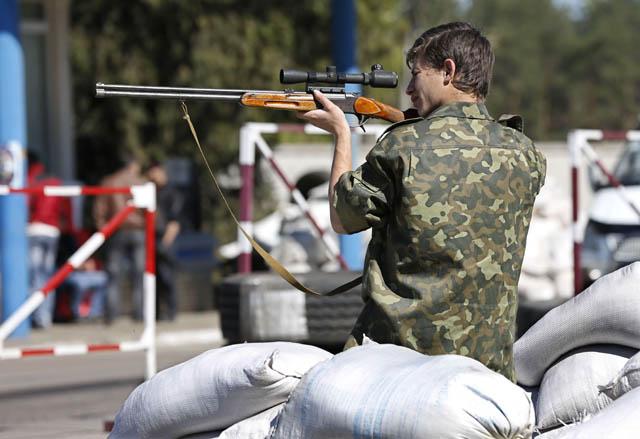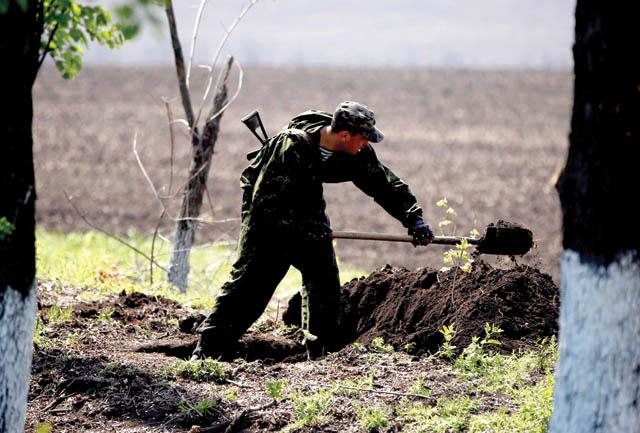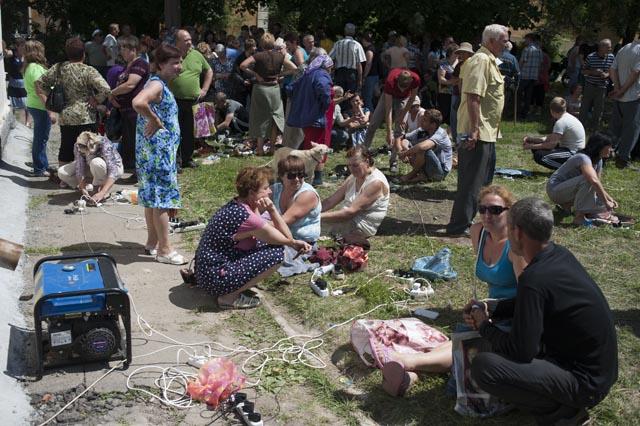You are here
G-7 agrees sanctions on Russia as tensions mount in Ukraine
By AFP - Apr 26,2014 - Last updated at Apr 26,2014

SLAVYANSK, Ukraine — The Group of Seven (G-7) rich countries have agreed to start slapping fresh sanctions on Moscow as early as Monday over the worsening Ukraine crisis amid Western fears of an imminent Russian invasion.
International tensions were mounting Saturday over the situation in the ex-Soviet republic, where sporadic fighting between pro-Kremlin rebels and Ukrainian security forces flared last week.
Russian warplanes violated Ukraine’s airspace several times on Thursday and Friday, the Pentagon said.
Russia has also begun new drills on the border, where it has tens of thousands of troops massed.
A Western diplomat warned: “We no longer exclude a Russian military intervention in Ukraine in the coming days.”
The diplomatic source noted that Russia’s UN envoy, Vitaly Churkin, “has been recalled urgently to Moscow” for consultations.
Ukraine’s prime minister, Arseniy Yatsenyuk, on Saturday cut short a trip to Rome after seeing Pope Francis, skipping a Sunday canonisation ceremony for Popes John Paul II and John XXIII “because of the situation,” his spokeswoman told AFP.
OSCE team
taken hostage
On the ground in east Ukraine, Kiev’s Western-backed government is waging an offensive against pro-Moscow rebels holding a string of towns.
A 13-member OSCE military observer team sent into Ukraine to monitor an April 17 Geneva accord designed to de-escalate the situation was being held hostage by rebels in the flashpoint town of Slavyansk.
The chief of the insurgents’ self-styled “Republic of Donetsk”, Denis Pushilin, accused them of being “NATO spies” and said they would only be released in a prisoner swap for militants detained by Ukrainian forces.
An AFP journalist in Slavyansk said a barricade around the building where the team from the Organisation for Security and Cooperation in Europe was being held had been greatly fortified with sandbags and a machinegun.
Washington and Europe called for the immediate release of the OSCE team, which includes members from Germany, Sweden, Denmark, Poland, the Czech Republic and Bulgaria.
German Foreign Minister Frank-Walter Steinmeier has urged his Russian counterpart, Sergei Lavrov, to intervene to have the team freed, officials in Berlin said.
Russia responded it would do everything in its power to win their release.
Kiev has accused Moscow — which it sees as controlling the rebels — of seeking to trigger a “third world war” and urged Russian troops to withdraw from the border.
Russia in turn has warned it has a “right” to invade to protect Ukraine’s Russian-speaking population concentrated in the east and southeast, sparking the worst East-West confrontation since the Cold War.
US eyes ‘tougher actions
The G-7 nations said in a joint statement they would “move swiftly to impose additional sanctions on Russia”.
“These sanctions will be coordinated and complementary, but not necessarily identical. US sanctions could come as early as Monday,” a senior US administration official said.
The Group of Seven consists of the United States, Britain, Canada, France, Germany, Italy and Japan. EU foreign ministers are also to meet soon to discuss the issue.
The United States and the European Union have already targeted Russian President Vladimir Putin’s inner circle with visa and asset freezes and imposed sanctions on a key Russian bank.
A senior White House official said the next round of sanctions could target “individuals with influence on the Russian economy, such as energy and banking”.
US Deputy National Security Advisor Ben Rhodes, speaking to reporters aboard Air Force One en route to Malaysia with President Barack Obama, spoke of “a spectrum of sanctions” that “allows us to escalate further” if the situation deteriorates.
Obama on Friday said that new sanctions against Russia were “ready to go” but had signalled they would not target key areas of the Russian economy such as the mining, energy and the financial sectors.
US officials have said those measures would only be considered if Russia sent its regular forces into Ukraine.
US Treasury Secretary Jacob Lew said sanctions were a long-term strategy.
“The goal is to hurt the Russian economy while doing the least damage necessary to the US and the global economy,” he told American public radio.
“We’ve made clear we’re prepared to take tougher actions and prepared to absorb the consequences of that if we need to.”
Tensions on the ground
Tensions have been heightened within Ukraine, with the military pursuing a new offensive against the rebels.
Slavyansk is under siege. Several locals and insurgents there told AFP a roadblock on the town’s outskirts came under fire overnight but no-one was hurt. The rebels there have vowed they will never surrender.
The insurgents in the east have conducted their own attacks. On Friday, they blew up an army helicopter with a rocket-propelled grenade in the town of Kramatorsk, wounding the pilot.
Ukraine’s Deputy Foreign Minister Danylo Lubkivsky told reporters at the United Nations that his country would exercise restraint in its operations against pro-Russian separatists.
“The anti-terrorist operation is ongoing, but we are guided by one major idea: we would like to avoid any victims or casualties,” he said.
‘Expensive mistake’
The crisis over Ukraine has plunged relations between the West and Russia to its lowest point since the Cold War.
Russia refuses to accept the legitimacy of Kiev’s new pro-EU government, which came to power after four months of street protests forced the ouster of the Kremlin-backed president, Viktor Yanukovych.
Last month, Moscow annexed Ukraine’s peninsula of Crimea after deploying troops, sparking international outrage.
With the threat of further sanctions hanging over Russia’s already shaky economy, ratings agency Standard and Poor’s on Friday downgraded its credit rating to one notch above junk status.
Russia’s central bank reacted by raising its key interest rate.
US Secretary of State John Kerry has warned that Russia could be making “an expensive mistake” in Ukraine.
While Obama has ruled out sending US or NATO forces into Ukraine, Washington has begun deploying 600 US troops to bolster NATO’s defences in nearby eastern European states.
France also said it was sending four fighter jets to join NATO air patrols over the Baltic states.
Washington and Moscow have traded barbs over Ukraine, with Lavrov claiming the push against rebels in the east was part of a US plot to “seize” Ukraine for its own “geopolitical ambitions and not the interests of the Ukrainian people”.
The White House has urged Moscow to “choose a peaceful resolution to the crisis” by implementing the Geneva deal, which calls for “illegal armed groups” to lay down their weapons and end their occupation of public buildings.
Related Articles
Pro-Russian rebels in Ukraine freed a Swedish observer on Sunday, but said they had no plans to release seven other European monitors they have been holding for three days.
The United States and Europe on Monday whacked Russia with fresh sanctions over Ukraine for failing to stop tensions soaring in the east of the ex-Soviet republic, where rebels seized another town and a pro-Moscow mayor was badly wounded by a shot to the back.
Ukraine’s interior minister said on Saturday that most pro-Russian rebels and their top commander had fled their main eastern stronghold in what would be Kiev’s biggest success of the nearly three-month campaign.


















